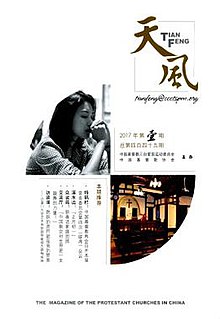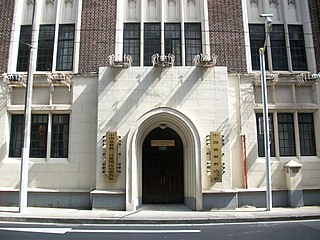
In China, house churches or family churches are Christian assemblies in the People's Republic of China that operate independently from the state-sanctioned Three-Self Patriotic Movement (TSPM) and China Christian Council (CCC), and came into existence due to the change in religious policy after the end of the Cultural Revolution in the early-1980s.
The term underground church is used to refer to Chinese Catholic churches in the People's Republic of China which have chosen not to associate with the state-sanctioned Chinese Patriotic Catholic Association, they are also called loyal church. Underground churches came into existence in the 1950s, after the communist party's establishment of the People's Republic of China, due to the severing of ties between Chinese Catholics and the Holy See.
The 4th Plenary Session of the 10th CPPCC National Committee, or more formally, the 4th Plenary Session of the 10th National Committee of the Chinese People's Political Consultative Conference was held in Beijing, in conjunction with the 2006 NPC Session. The Three Nongs are slated to be one of the major topics of discussion. The discussions held are largely ceremonial. Eminent delegates at the session include Luo Haocai, former Hong Kong Chief Executive Tung Chee Hwa, Chinese arts show host Yang Lan, and agricultural scientist Yuan Longping.
The United Front in China is a popular front of the legally permitted parties in the country, led by the Communist Party of China (CPC). Besides the CPC, it includes eight minor parties and the All-China Federation of Industry and Commerce. It is managed by the CPC Central Committee United Front Work Department. Its current department head is You Quan. The member parties of the Front are completely subservient to the CPC, and must accept the "leading role" of the CPC as a condition of their continued existence.

Paul Kwong is the incumbent Archbishop and Primate of Hong Kong Anglican Church, Bishop of Hong Kong Island, and Bishop of Macau. Kwong is also the current chair of the Anglican Consultative Council, as the first sitting primate to lead an ACC meeting. Kwong is also a member of the Chinese People's Political Consultative Conference (CPPCC) taking a pro-Beijing stance.
The Shouters, or more properly the Shouters sect (呼喊派), is a label attached by the People's Republic of China (PRC) to an amorphous group within China that was targeted by the government first as counterrevolutionaries and subsequently as a criminal cult after incidents in Dongyang and Yiwu counties in Zhejiang province in February 1982. "The Shouters sect" became the object of waves of arrests in 1983 and again in 1995. Several 1983 publications with ties to the Three-Self Patriotic Movement (TSPM) accused the late expatriate Chinese Christian teacher Witness Lee of being the leader of "the Shouters sect" and of instigating the disorders. In practice, however, the appellation "the Shouters sect" has been applied far more broadly to many groups that pray openly and audibly and/or do not register or otherwise cooperate with the TSPM. There is considerable reason to doubt the veracity of the reports which led to the condemnation of "the Shouters sect" and the association of them with Witness Lee or the local churches, and the local churches distance themselves from the Shouters.

The Chairman of the National Committee of the Chinese People's Political Consultative Conference is the leader of the National Committee of the Chinese People's Political Consultative Conference, which is a political advisory body in the People's Republic of China. The current Chairman is Wang Yang, who is the 4th-ranked member of the CPC Politburo Standing Committee.
The Vice Chairperson of the National Committee of the Chinese People's Political Consultative Conference (CPPCC) is a political office in the People's Republic of China. The official responsibility of the Vice Chairpersons is to assist the Chairperson of the Chinese People's Political Consultative Conference with the leadership of the Chinese People's Political Consultative Conference Standing Committee. News reports have also suggested that the position of CPPCC Vice Chairperson, as a state-level post with a retirement age of 70, has been used as a device to extend the services of valued officials beyond the typical retirement age for their position. The appointment of People's Bank of China Governor Zhou Xiaochuan as a Vice Chairperson in 2013 was said to be for this purpose, and the Chinese leadership may be considering a similar appointment for Minister of Finance Lou Jiwei.

Tian Feng: The Magazine of the Protestant Churches in China is the organ of the Three-Self Patriotic Movement (TSPM), the state-sanctioned body of Protestant Christians in China, and the most widely circulated Christian magazine in the country.
The National Christian Council of China (NCC) was a Protestant organization in China. Its members were both Chinese Protestant churches and foreign missionary societies and its purpose was to promote cooperation among these churches and societies. The NCC was formed in 1922 in the aftermath of the Edinburgh Missionary Conference.
Peter Fang Jianping is a Chinese Roman Catholic Bishop of Roman Catholic Diocese of Hebei, China. He is also vice-president of the Bishops Conference of the Catholic Church in China (BCCCC).
Joseph Liu Yuanren was a Chinese Roman Catholic Bishop of Roman Catholic Diocese of Jiangsu, China. He also served as vice-president of Chinese Patriotic Catholic Association from 1998 until his death in 2005.
Zong Huaide was a Chinese Roman Catholic Bishop of Roman Catholic Diocese of Shandong, China. In the final years of his life, he achieved high offices in the church and CCP-supported Catholic organizations.
John Fang Xingyao is a Chinese Roman Catholic Bishop of Roman Catholic Diocese of Shandong, China. He is the current president of the Chinese Patriotic Catholic Association.
Ignatius Pi Shushi was a Chinese Roman Catholic Bishop of Roman Catholic Diocese of Liaoning, China. He was one of the founding fathers and the first president of the Chinese Patriotic Catholic Association, the top CCP-supported Catholic institution in China.
Zhang Wenbin is a Chinese politician who served as the first Chairman of the Chinese People's Political Consultative Conference (CPPCC) of the Chongqing municipality.












